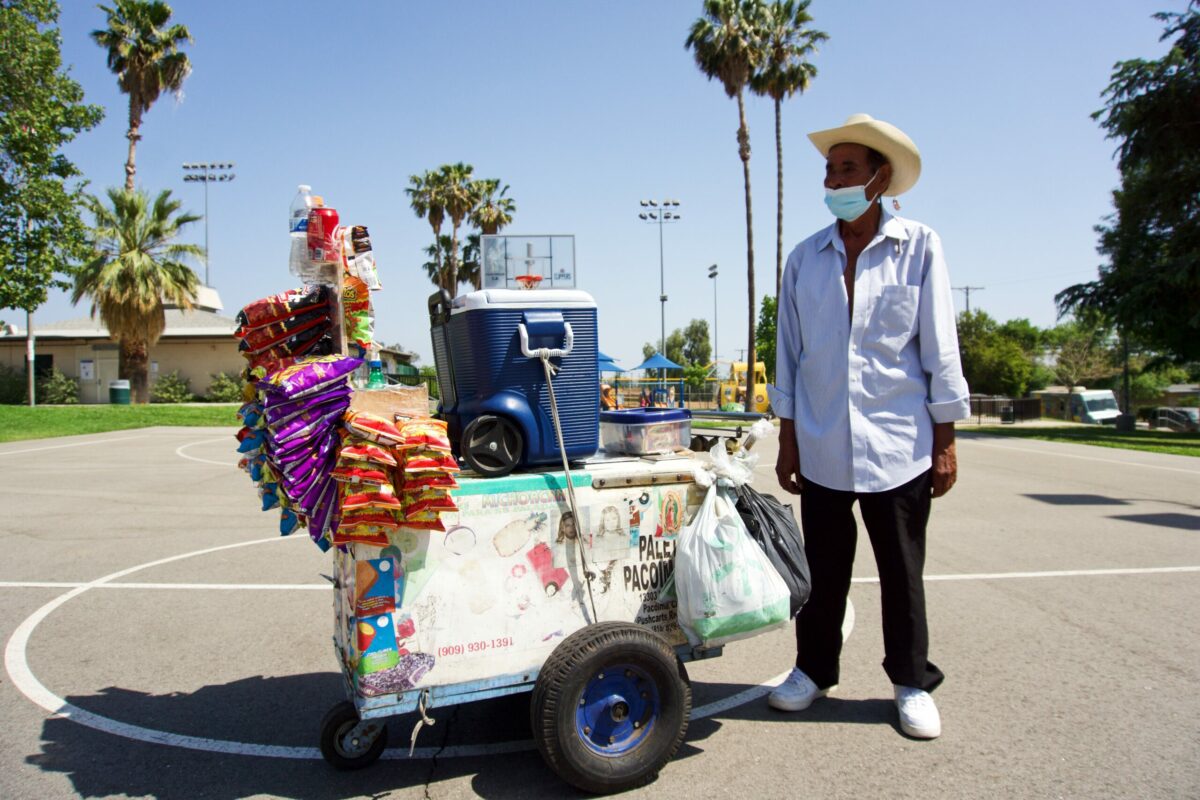[dropcap size=big]P[/dropcap]aletero man Don Maximiliano García Vázquez of Pacoima sits under the shade of a tree at Humphrey Park. He holds up Saturday's newspaper and points at the cover, chuckling. He says “¡Mira ya soy famoso!” “Look, I'm famous now!”
The 73-year-old paletero (ice cream man) has recently received an outpour of support from the community he has served for over 20 years. This after news about his financial hardships went viral.
The ice cream vendor who has established notoriety in the San Fernando Valley had fallen into hard times since the pandemic began. But with his entire family back in Guerrero, Mexico, and with no connections in Pacoima, the vendor was on his own.
That was until 24-year-old barber Miguel Angel Talavera, who grew up seeing Vázquez around the neighborhood, decided to approach him, not knowing how far that small gesture would take him.
“I didn't really start to have regular conversations with him until the pandemic happened,” says Talavera.
Working from home, Talavera began to notice Vázquez every day pushing his ice cream cart that was filled with paletas (popsicles), a cooler with sodas, and a variety of chips and candy down the block. When summer rolled around, the Pacoima barber was shocked to see Vázquez working in what he recalls to be 113-degree weather. The paletero was working 11 to 12-hour shifts in the hot sun at the time, pushing a cart that is estimated to weigh a little over 200 pounds when loaded with inventory.
“He's roughly around my dad's age, and I mean it hits you, that could be your family member in that situation,” Talavera says, looking back at Vázquez. “I started thinking like what would I think if that was a family relative, if that was someone I knew, how would I want people to treat them.”
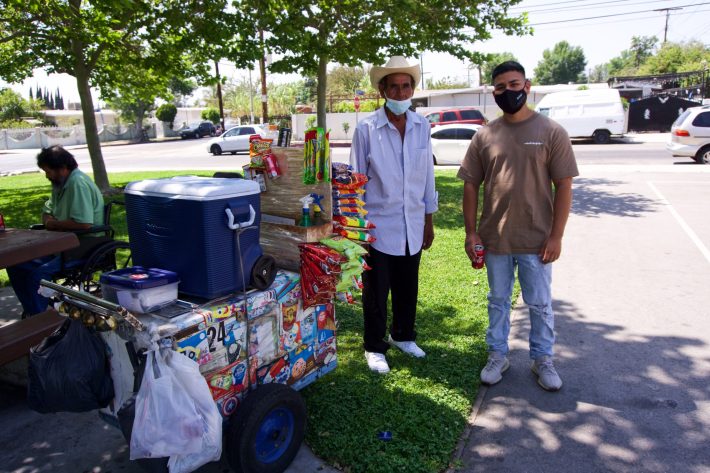
So he made an effort to get to know the paletero, over a cold Coca-Cola that Talavera would purchase from Vázquez, they would begin to have daily conversations.
But in November of 2020, Talavera tested positive for Covid-19, and their conversations came to a halt. After not seeing his paletero man for two weeks because he was quarantined, the barber noticed that Vázquez was not doing his usual rounds around the neighborhood.
“I knew he would sometimes take a day off if his arm was hurting or if he wasn't feeling good, but other than that, he would be out there every day,” he says. “During that time, a lot of people were getting sick in the area, so I assumed he got Covid.”
With no phone number to reach him at, Talavera began to search for the paletero everywhere. Two more months would pass when finally, in the middle of February 2021, the 24-year-old saw Vázquez again. “I immediately noticed he was a lot skinnier,” he says.
Vázquez had been in the hospital for three months due to severely low blood pressure. Finding this out gave Talavera and his girlfriend the idea of starting a GoFundMe account to recuperate the money Vázquez lost in those months. Along with Vázquez's permission, he also began to encourage his friends and neighbors who followed him online to support the paletero if they ever saw him selling in the streets. He says he wanted to make sure their paletero felt appreciated by the community.
In that first round of donations, Talavera collected $3,600, which were given to Vázquez in the middle of April. During this time, the vendor opened up to the 24-year-old and told him he would use some of the money to pay bills from prior surgery. He would also use some of the money to pay backed-up rent and send money back home to his wife, who also happens to require medical assistance.
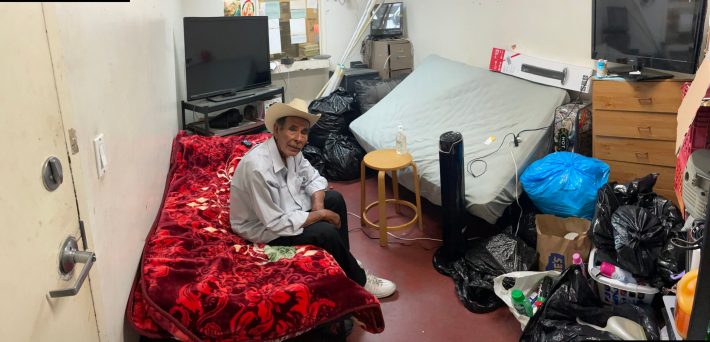
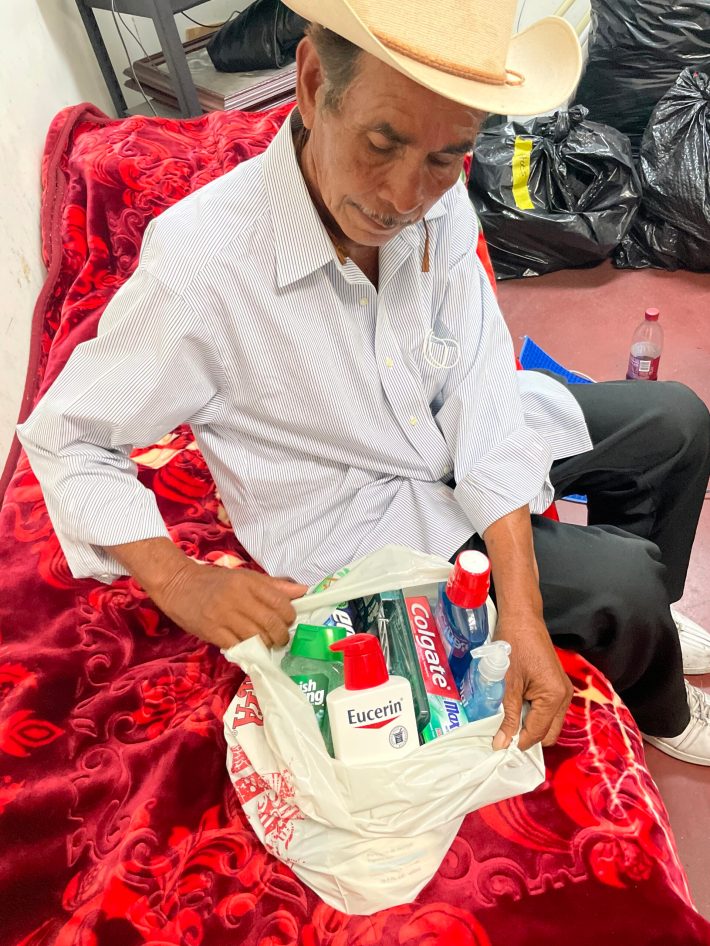
“Then two weeks ago, he let me know about his current living situation and how they were trying to evict him, and he didn't know if they were able to do that,” Talavera says. “They gave him a two-day notice.”
Vázquez was supposed to be out of the room he rented by April 30, but one day after he got back from selling paletas, he arrived home to find his belongings outside stuffed in black plastic bags. He had been evicted.
“I'm so thankful for the help Miguel has provided me with, you know over the years I’ve been through a lot and have always gone through it alone,” says Vázquez as he waits for customers to walk up. “But not this time. This time I have him and everyone else.”
The paletero is now temporarily sleeping in a storage room where a small corner has become his new home. The corner is complete with a bed, three bags, and essentials donated to him. Talavera also bought the vendor a fan because the storage room has little ventilation.
Although Talavera has stepped in to help Vázquez, the barber still worries about the paletero’s well-being. Saying that aside from financial hardships, the vendor has been attacked multiple times in the past. Describing a time where the paletero had his throat slashed by a man who robbed him. Vázquez had to get surgery for that injury and now has a scar running down the right side of his neck.
Talavera says people need to make more of an effort to get to know the vendors around them. “They work so hard; the least we could do is show respect to them.”
On average, Vázquez makes $20 a day and on a good day $40, this during his 12-hour shifts.
“It’s just sad they came here for a better life, but those wages just don't add up,” he says. “I can't even imagine how you're supposed to buy necessities that you need when you're making that type of income.”
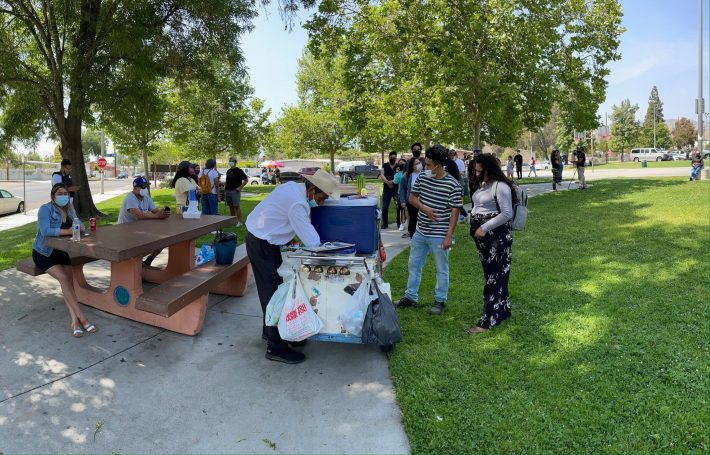
Executive Director of Inclusive Action, Rudy Espinoza, says Vázquez's story is just one of many street vendors in our communities who are struggling with similar issues. And with Los Angeles getting ready to receive a massive federal relief package that, according to LA Times, will allocate $1.35 billion to the city, advocates like Espinoza wonder if vendors will receive any of that aid.
“Before the pandemic, they (vendors) were one crisis away from losing their housing, and COVID-19 has been a year-long crisis that has left many in extreme circumstances. I hope that as our leaders plan for the recovery, they consider how resources and legislation can help vulnerable workers like Maximiliano,” Espinoza says. “We have an opportunity to realize a "just" recovery. The billions that are coming to L.A. from the federal government should include support for our street vendors too!”
One of Vazquez’s customers, Vianey Moreno, feels the same way, saying more help is needed.
On Saturday, she walked up to Vázquez and asked him if he was ready for Sunday’s buyout. “Si si (yes yes),” he says. Moreno grew up across Humphrey park, where Vázquez often stops to rest and sell. She remembers always running to his pushcart after school.
“When you think of Pacoima, you think of Don Max. He is the paletero that has always been around,” she says after buying a bag of Takis from him. “His story speaks a lot about the deeper working class here in Pacoima.”
Despite his financial struggles, Moreno recalls hearing stories about Vázquez letting kids in the neighborhood pay him back whenever they couldn't afford what they wanted—describing Vázquez as a very giving man.
“La gente (the people) sometimes don’t have money to buy popsicles for the kids because the pandemic has affected them too, so I try to help by letting them pay me later,” says Vázquez. “Son niños (they're kids) they don't understand that mom can't afford a paleta.”
Vázquez, or “Don Max,” as he’s often called, hopes to retire in November and go back to Guererro, where his family resides. “Ya estoy cansado (I'm tired already,)” he says as he sits down on a bench.
At 73, he still enjoys being a paletero and says if he could, he would go back to Guererro in the wintertime and return to Pacoima in the summer to sell paletas. But because of his legal status, he will be more likely to stay in Guererro once he retires.
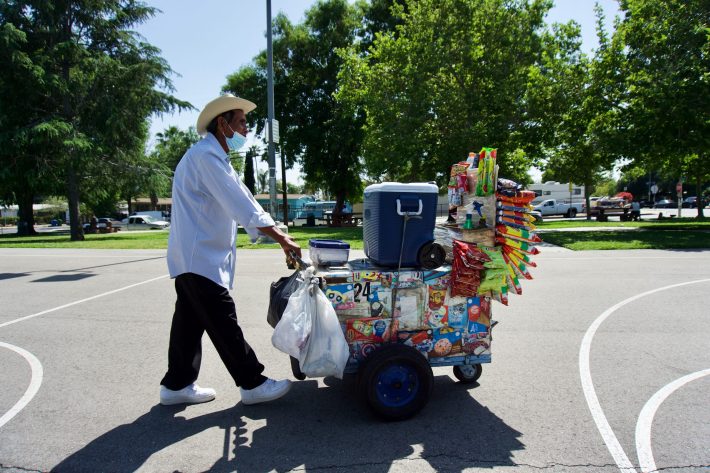
This past Sunday, Talavera, along with Las Calles del Valle, organized a buyout for “Don Max” and altogether have been able to raise to $20,000 for him. Money that will likely go to Vázquez’s medical bills, family, and other necessities. The main goal is to get Vázquez to be financially stable and get him into better living conditions. After speaking with L.A. TACO, Talavera took Vázquez to see a potential room for rent on Saturday. They want to make sure they get something that is not far from his daily route.
“I sometimes think what if I hadn't talked to him. I wonder if anyone else would have helped him,” Talavera says. “Just by starting to talk to him, I learned all these other things he was dealing with.”
Moreno thinks that more people should take Vázquez’s story with Talavera more seriously and use it as an example of what communities everywhere should be doing.
“I think that's what community aid is. The city isn’t going to come here and say, here's a home here's some money. So when other parts of our system are failing him (vendors), we step in to help because the community always pulls up.”
Anyone who wants to donate to Vázquez can donate to his GoFundMe here.
The interview with Maximiliano was conducted in Spanish and translated into English by the author.
